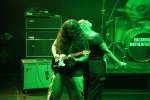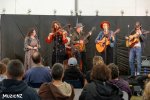Jacquie Walters - Album Review: The Forest
 Jacquie Walters has been active in the folk scene for more than 30
years, firstly as part of the group Pounamu before turning solo, and now
performs regularly with bassist/guitarist James Wilkinson. James appears on the final track of this album, and harp player Maria Oxnam also makes an appearance - both James and Maria played on Jacquie’s
first album all the way back in 1993. The folk scene in New Zealand is fascinating
in that it is often a melting pot of different styles, and actually covers a
much broader base than it does in the UK for example, so when I see that an
album or artist is described as being folk, I am always intrigued to hear
exactly what they mean. Here we have an album that I would indeed describe as
modern folk, particularly of the English persuasion, combined with Sixties-style
singer-songwriter, and very pleasant it is too. Apparently, Wilkinson was also
responsible for the production, and the result is an album that is incredibly
clear and sonically well-balanced, so much so that one thinks they are in the
room with the performers. Jacquie has a wonderfully clear voice, and tends to
sing more alto than soprano, with picked guitar providing delicate accompaniment
(no percussion).
Jacquie Walters has been active in the folk scene for more than 30
years, firstly as part of the group Pounamu before turning solo, and now
performs regularly with bassist/guitarist James Wilkinson. James appears on the final track of this album, and harp player Maria Oxnam also makes an appearance - both James and Maria played on Jacquie’s
first album all the way back in 1993. The folk scene in New Zealand is fascinating
in that it is often a melting pot of different styles, and actually covers a
much broader base than it does in the UK for example, so when I see that an
album or artist is described as being folk, I am always intrigued to hear
exactly what they mean. Here we have an album that I would indeed describe as
modern folk, particularly of the English persuasion, combined with Sixties-style
singer-songwriter, and very pleasant it is too. Apparently, Wilkinson was also
responsible for the production, and the result is an album that is incredibly
clear and sonically well-balanced, so much so that one thinks they are in the
room with the performers. Jacquie has a wonderfully clear voice, and tends to
sing more alto than soprano, with picked guitar providing delicate accompaniment
(no percussion).
The album opens with Whakatu, which sadly is the only track to feature Maria, as the gentle touch of the harp does provide some additional depth and I would have liked to have heard more of her on the album. Whakatu is the traditional name for Nelson, and much of this song is performed in Te Reo, and it is a gentle introduction, atmospheric and somehow not quite as direct as the rest of the album. From here on in much of the rest of the album follows a pattern of vocals and picked acoustic guitar, and even though I played this multiple times I found that many of the songs appeared to blur into each other. When there is a change, such as on the title track, which also has some wonderful fretless bass, it stands out even though yet again the song has a base of picked guitar on vocals. The highlight is probably the closing number, Kiss Me In The Morning, which brings in some country and American style, with a riffed acoustic as opposed to picked, the bass is back, we have additional harmony vocals, and Jacquie allows herself some freedom and it genuinely sounds like she is having fun.
Strangely, I found that if I played just one song out of the 12, then went away and came back later to another, I enjoyed the album far more. Individually each song sounds incredibly special, with Jacquie’s vocals perfectly accompanied by the instrumentation. I am sure it will be different when this album is played live, and everyone becomes lost in the moment, but even though I really wanted to enjoy this, I felt that much of it washed over me.
Other Reviews By Kev Rowland
07 Jul 2023 // by Kev Rowland
So it was down to Tuning Fork for the first night of the second Crushfest festival. Tonight was going to be Wellington and Auckland bands, and then some of the same will be playing at the second night in Wellington next month.
Read More...
 Rain - Single Review: Love and War
Rain - Single Review: Love and War
15 Jun 2023 // by Kev Rowland
It has been quite a while since I last heard from Wellington-based singer songwriter Cathy Elizabeth, and back then Rain was seen solely as a studio project with Cathy being accompanied by Thomas Te Taite, who provided all the instrumentation including digital drums. Now they are a full band who have been performing live, and it is the first time they have recorded as such, with Thomas now, just providing acoustic guitar (plus engineering and producing etc.
Read More...
 Lost Vessels - Single Review: All This Time
Lost Vessels - Single Review: All This Time
01 Jun 2023 // by Kev Rowland
I must admit I was not that impressed when I first saw Lost Vessels play at Crushfest, something they later admitted to me was the worst gig of their career, but since then they have improved in leaps and bounds. This has been noticed by others on the Auckland circuit as they are getting more opportunities with better support slots, and I was not at all surprised when they won the Ding Dong Lounge Battle Of The Bands in November last year.
Read More...
 Unwanted Subject - Single Review: Sons of Savages
Unwanted Subject - Single Review: Sons of Savages
28 May 2023 // by Kev Rowland
I have caught Unwanted Subject in concert a few times over the last couple of years, and while they have been getting better each time I have seen them, I must admit that nothing prepared me for this, which right from the off is a monster. I have never heard them quite this is aggressive, nor as polished, and this multi-sectioned single sounds almost like a different band as they have pushed their metal roots to the max in this metalcore beast which sees them mixing and blending different genres to create something quite special.
Read More...
 Gig Review: Stray Dogs @ AUX, Auckland - 26/05/2023
Gig Review: Stray Dogs @ AUX, Auckland - 26/05/2023
28 May 2023 // by Kev Rowland
So it was back to Ding Dong Lounge on a Friday night for one of their infamous Emo nights, which tonight was a three-band bill with Stray Dogs having an extended set, supported by Altaea and then up first we had Blindr, a band new to me. Blindr are a quartet featuring Bill Caldwell (vocals, guitar), Blake Woodfield (lead guitar), Jack Power (bass), and Charlie McCracken (drums).
Read More...
 Gig Review: Turkey The Bird @ The Ministry of Folk, Auckland - 27/05/2023
Gig Review: Turkey The Bird @ The Ministry of Folk, Auckland - 27/05/2023
27 May 2023 // by Kev Rowland
Back up to Auckland Guide Centre in Mount Eden tonight for my second consecutive gig (Sol suggested it was a turkey sandwich as I am at Vader tomorrow) to see Taranaki’s finest, Turkey The Bird at The Ministry of Folk. Before that we of course had Hoop, who are Al Baxter (vocals, guitar, harmonica, banjo, mandolin), Nick Edgar (vocals, guitar, ukulele, flute, harmonica), Emily Allen (violin, viola), Glenn Coldham (bass) while tonight Gary Hunt was filling in for drummer Rusty Knox.
Read More...
 This Silent Divide - Single Review: Beautiful Creature
This Silent Divide - Single Review: Beautiful Creature
25 May 2023 // by Kev Rowland
Here we have the latest single from Wellington-based melodic hard rock quartet This Silent Divide, entitled Beautiful Creature. I really enjoyed their Tall Stories EP, and they played a great gig at Dead Witch towards the end of last year, and this would have been recorded at about the same time.
Read More...
 Gig Review: Emily Rice @ Your Local Coffee Roasters, Pukekohe - 24/05/2023
Gig Review: Emily Rice @ Your Local Coffee Roasters, Pukekohe - 24/05/2023
24 May 2023 // by Kev Rowland
Earlier this week I had a message from Emily Rice asking me if I lived in South Auckland. When I responded I did, she asked if I would be interested in coming along to an event she was putting on in a coffee shop in Pukekohe to celebrate the release of her new single, Warenoa.
Read More...
Most Viewed Artists
Latest Galleries
NZ Top 10 Singles
- APT.
ROSÉ And Bruno Mars - DIE WITH A SMILE
Lady Gaga And Bruno Mars - BIRDS OF A FEATHER
Billie Eilish - TASTE
Sabrina Carpenter - I LOVE YOU, I'M SORRY
Gracie Abrams - ESPRESSO
Sabrina Carpenter - SAILOR SONG
Gigi Perez - LOSE CONTROL
Teddy Swims - A BAR SONG (TIPSY)
Shaboozey - GOOD LUCK, BABE!
Chappell Roan








 Report A Problem
Report A Problem

